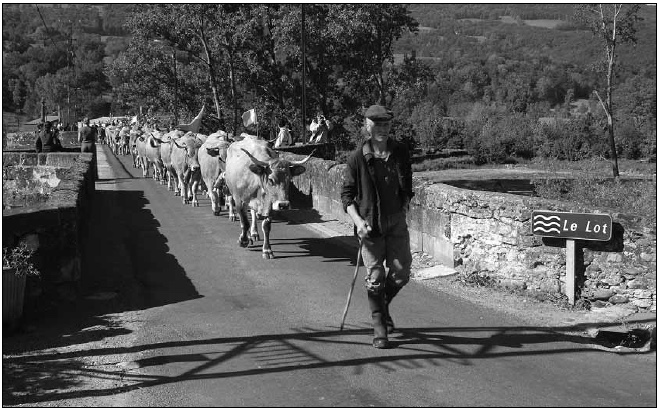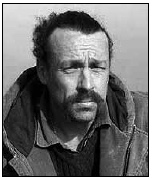“I am a farmer, not a businessman!”
“I am a farmer, not a businessman!”
Interview with Benoît Biteau*, conducted for Figarovox by Paul Sugy
While the agricultural fair is opening in Paris, Benoît Biteau joins resistance. This farmer stands up for a different agricultural model that more strongly respects the soil, the earth and the people... at the risk of some golden calves such as the FNSEA (Fédération nationale des syndicats d’exploitants agricoles = French Farmers’ Union), the WTO or the current requirements of CAP (Common Agricultural Policy of the EU) being taken to the slaughterhouse.

Figarovox: In your book you introduce yourself as a “farmer” and not as a “businessman” (exploitant). What do you mean by this distinction?
Benoît Biteau: What is hidden in depth behind the lexical field of the term “exploitation” [double meaning in French: management as well as exploitation] is a distorted relationship between man and earth, between man and animal and between humans. We are the guardians of life, not managers. Precisely because of the appeal of violence in this term, I was looking for a word in which I find myself better: I am a farmer because I do not exploit anyone, but on the contrary, because I cooperate with life. This is my definition of agricultural science: to observe the ecosystems that produce biomass, such as the forest, and then reproduce their logic in agriculture. In my book, I try to bring together all pieces of a big puzzle to show that all issues related to agriculture, food and climate are connected to one another.
In your book, you tell us that you are the heir to a long family farming tradition. How has agriculture developed in the course of your personal history and how has this heritage shaped your relationship with the earth?
My paternal and maternal grandparents have conveyed strong values to me. I have learned basic values from them, some kind of fraternal humanity, also a pacifist logic, because my family suffered so badly from the war. These values have been reflected in their daily lives, even in their farming profession. To sum up in one word: What these values include is respect. They have made great efforts to respect the resources, the animals, the soil … and in the backpack, which my family history has left me, we find these seeds of humanity and respect. Therefore, I was not able to adopt the prevailing agricultural model, which however, was implemented by my own father. During my career and my studies, I discovered things that my father undoubtedly knew nothing about, but which made me think and gradually distanced me from the ways of thinking to which he had directed his management: the harmful effects of pesticides and fertilisers, the excessive use of water.... It must also be said that all this has only been revealed by recent studies.
So you are moving in the opposite direction. What kind of agriculture do you practice as a farmer and as a resistance fighter? Against whom or against what do you fight?
I have decided on a balance and refused to immerse into the scientific logic that everything science invents is necessarily good. However, I am not against all progress. I am watching the progress which science holds for us and measure it by its contribution to the common good and what it means in regards to professional difficulties. I simply use rural common sense. In other words, I am planning long term with a global approach. It is about preserving the territorial balances, the resources, in particular the water, because these days agriculture is wasting a lot. In fact, we need water, but crop irrigation must not exceed the resources available! Respect, here too…Using rural common sense also means preserving domestic biodiversity, because 90% of the seeds have been lost in the last century… the famous “forbidden seeds” that Carrefour had defended in a remarkable marketing campaign. Agriculture also has to take care of its impact on the climate: 70% of the land is agriculture dominated, so it is obvious that it has a significant impact on the climate and that it is advisable to think about it. However, but also because agriculture is the first to suffer from climate change. Stéphane Le Fol proposed an approach that seemed interesting to me: To increase the soil organic matter rate by only 4/1000 on all soils of the planet would be enough for agriculture to absorb three quarters of the greenhouse gases produced by human activities. This is a step in the right direction and can make agriculture the saviour of the climate.
After all, agriculture is also interested in health. If the aim is to feed consumers, how can we seriously put products on their plates that contain pesticides that are harmful to our health? All the more, as the farmers themselves are among the first victims. My book is also written for Yannick, my childhood friend, a farmer as well. I accompanied him for eight painful years before he left us, carried away by a disease caused by the chemical products in our agriculture.
Overall, rural common sense is a holistic approach that addresses both the soil and the earth. If I am in resistance, it is because I actually observe that after the war an agricultural model was developed that helped industrial companies to switch to food without taking the specific nature of the farming profession into account. Far from respect and rural common sense.
In 2020, the CAP is supposed to launch a profound reform. In your book, you make huge allegations against this reform. In your opinion, what is the direction this reform should take?
I see two main points. It is necessary to get out of this logic, which distributes aid in proportion to the area available to the farmers (the more hectares we have, the more subsidies we receive). At a time when more and more young people are interested in returning to the countryside, aid should no longer be distributed on the basis of area, but according to the number of human manpower. The more jobs the farmers create, the more they should be rewarded! Don’t we have an employment problem today? And it would also help to get out of this speculative land logic that is bad for agriculture. Moreover, it is necessary to get out of the logic of subsidies and to introduce a logic of compensation for the services provided to society. For example, a farmer who restricts irrigation in order to preserve water resources must be compensated. The taxpayers will find themselves here, because preventive measures for the environment are far less expensive than remedial measures. The majority of farmers are interested in such trends.
You are using very harsh words against the majority union of farmers, the FNSEA, and you denounce its monopoly on representation. What are your complaints against them?
In fact, I accuse the FNSEA of not serving the peasants, but on the contrary, being the real ally of those who enrich themselves at our expense! These are the food industry or the chemical industry. You cannot defend the farmers that way. If the FNSEA makes the case for defending glyphosate, then it supports the camp of the dealers and not the camp of the producers. I can hardly believe it! Nobody can understand the positions of this union. And if it still has a majority today, it’s because it’s at the head of a moloch-like system that obstructs all those involved: the chambers of agriculture, the banks, the peasant’s health system (which, by the way, is still struggling with recognising the particular diseases, that usually hit farmers, as occupational diseases). The only reason why we still are voting for the FNSEA is to have access to land, to own shares in a cooperative or to get agricultural loans... For all this you must vote for them. Once we built up an animal feed cooperation aiming at mitigating the bottleneck caused by bad weather. Once again the FNSEA had the monopoly on it: If we ordered a ton of hay at the FSNEA we would still be financing it! Agriculture is a topic of real social importance and a real debate must be possible. The trade union monopoly practiced by the FNSEA is not good, especially as it affects all taxpayers beyond the farmers.
What do you mean by writing that we have to “remove agriculture from WTO”?
It is really urgent! Uncontrolled speculation with agricultural commodities as if they were gold bars is completely unacceptable. My question is if food, which is a vital need, is a wealth like any other. Do we really have to apply here the same liberal and mercantile logic as with all other commercial values? Obviously not, at least if we still believe in the common sense of the peasant.
Do you think Emmanuel Macron’s proposals, in particular those he talked about before 700 young farmers on Thursday evening, are going in the right direction?
Unfortunately, I believe that Emmanuel Macron, when presenting large-scale investment projects (he spoke of a plan of one billion euro in the form of guaranteed loans to farmers), will still finance those of us who have the most means with others words those that do not need it. Because, if there is an investment plan, then also subsidised farmers must have a financing capacity. However, this will not be those who earn 350 euros a month and who do not even have one euro to pay the canteen for their child! They will simply keep on disappearing from the scene…
You conclude by saying that you are writing “for generations to come”. Finally, what do you want to say to a young farmer who builds up or takes over a farm?
I would like to give them a message of hope! There is, in fact, a new interest in agricultural projects today, and we must now find legislative measures that will make it possible to support these ambitious projects. That’s what I base my trust in, and so I send a firmly optimistic message by presenting solutions, projects that work, and I hope they will generate enthusiasm among the citizens. It is in the interest of everyone! •
Source: © Figarovox from 23 March 2018
(Translation Current Concerns)


* Benoît Biteau is a peasant agronomist at “EARL Val de Seudre Identi’Terre” (an organic farm with old breeds of animals and forestry). He is a member of the Regional Council of Nouvelle-Aquitaine in France. In February, he has published his book “Paysan résistant!” (Farmer and Resistance[fighter], Edition Fayard 2018). In this book, he returns to the peasant values inherited from his family in order to stand up for a responsible agriculture and to propose new solutions to tomorrow’s challenges in the fields of agriculture, food and climate.